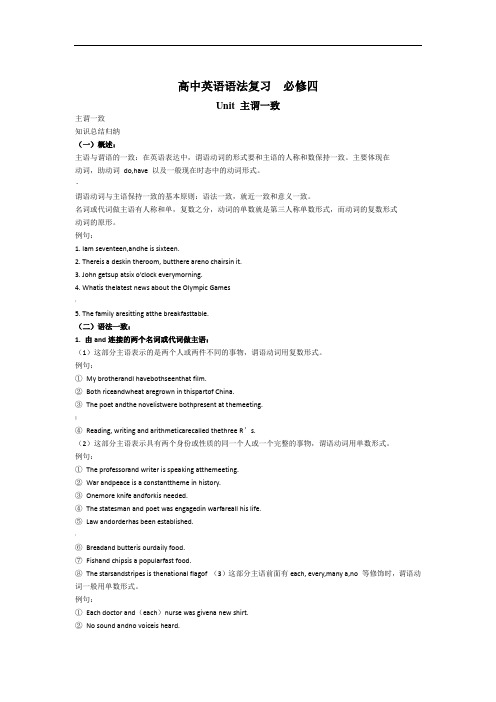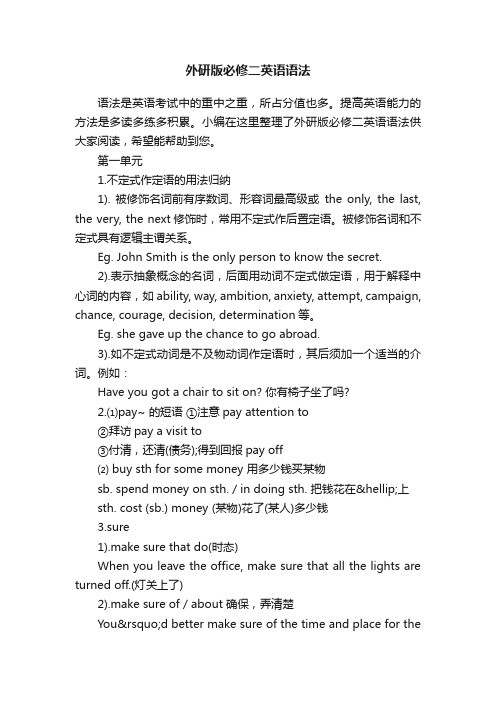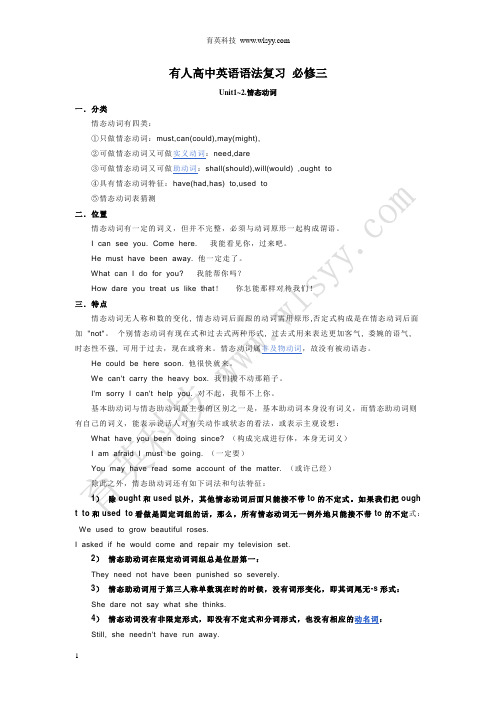高中英语语法复习 必修二【by swasky】
高中英语语法复习--必修四【by-swasky】

高中英语语法复习必修四Unit 主谓一致主谓一致知识总结归纳(一)概述:主语与谓语的一致:在英语表达中,谓语动词的形式要和主语的人称和数保持一致。
主要体现在动词,助动词do,have 以及一般现在时态中的动词形式。
·谓语动词与主语保持一致的基本原则:语法一致,就近一致和意义一致。
名词或代词做主语有人称和单,复数之分,动词的单数就是第三人称单数形式,而动词的复数形式动词的原形。
例句:1. Iam seventeen,andhe is sixteen.2. Thereis a deskin theroom, butthere areno chairsin it.3. John getsup atsix o’clock everymorning.4. Whatis thelatest news about the Olympic Games;5. The family aresitting atthe breakfasttable.(二)语法一致:1. 由and连接的两个名词或代词做主语:(1)这部分主语表示的是两个人或两件不同的事物,谓语动词用复数形式。
例句:①My brotherandI havebothseenthat film.②Both riceandwheat aregrown in thispartof China.③The poet andthe novelistwere bothpresent at themeeting.|④Reading, writing and arithmeticarecalled thethree R’s.(2)这部分主语表示具有两个身份或性质的同一个人或一个完整的事物,谓语动词用单数形式。
例句:①The professorand writer is speaking atthemeeting.②War andpeace is a constanttheme in history.③Onemore knife andforkis needed.④The statesman and poet was engagedin warfareall his life.⑤Law andorderhas been established.:⑥Breadand butteris ourdaily food.⑦Fishand chipsis a popularfast food.⑧The starsandstripes is thenational flagof (3)这部分主语前面有each, every,many a,no 等修饰时,谓语动词一般用单数形式。
高中英语外研版2019新教材选择性必修二unit2语法点

过去完成时的被动语态
1.构成: 过去完成时的被动语态由“had +been+过去分词”构成,表示在
过去某一时刻或某一动作之前发生的动作或状态,句中常用
by,before,until,when等词引导时间状语。
Five new buildings had been built by the end of last year.
到去年年底已经建了五栋新楼。
2.过去完成时的被动语态常用于以下情况:
(1)表示过去某一时间以前已经完成的动作,常与by,before等引导的
时间状语连用。
How many buildings had been destroyed when the hurricane ended?
飓风结束时有多少建筑物被毁?
By the time he got to the school,the first period had been finished.
他到学校时,第一课时已经结束了。
The classroom hadn’t been cleaned before the teacher came.
老师来之前教室还没有打扫过。
(2)在told,said,knew,heard,thought等动词之后的宾语从句中,若表示过
去某一被动动作时,用过去完成时的被动语态。
The boy was reminded that his homework had not been handed in.
有人提醒那个男孩,他的作业还没交。
(3)根据语意可以判断出发生动作先后的被动语态,用过去完成时。
He did what he had been told to.
他做了别人叫他做的事。
外研版必修二英语语法

外研版必修二英语语法语法是英语考试中的重中之重,所占分值也多。
提高英语能力的方法是多读多练多积累。
小编在这里整理了外研版必修二英语语法供大家阅读,希望能帮助到您。
第一单元1.不定式作定语的用法归纳1). 被修饰名词前有序数词、形容词最高级或the only, the last, the very, the next修饰时,常用不定式作后置定语。
被修饰名词和不定式具有逻辑主谓关系。
Eg. John Smith is the only person to know the secret.2).表示抽象概念的名词,后面用动词不定式做定语,用于解释中心词的内容,如ability, way, ambition, anxiety, attempt, campaign, chance, courage, decision, determination等。
Eg. she gave up the chance to go abroad.3).如不定式动词是不及物动词作定语时,其后须加一个适当的介词。
例如:Have you got a chair to sit on? 你有椅子坐了吗?2.⑴pay~ 的短语①注意pay attention to②拜访pay a visit to③付清,还清(债务);得到回报pay off⑵ buy sth for some money 用多少钱买某物sb. spend money on sth. / in doing sth. 把钱花在…上sth. cost (sb.) money (某物)花了(某人)多少钱3.sure1).make sure that do(时态)When you leave the office, make sure that all the lights are turned off.(灯关上了)2).make sure of / about 确保,弄清楚You’d better make sure of the time and place for themeeting .(弄清楚开会得时间和地点)3) be sure to do肯定会,务必 Be sure to come on time.be sure of / about 有把握,肯定He is to succeed/ win. 他肯定会赢。
高一英语必修二语法复习 ppt课件

B3 Unit1 情态动词的用法
1. ----May I take this book out? ----No, you___. A. can't B. may not C. needn't D. aren't
2. ---He___ be in the classroom, I think. ---No, he ___ be in the classroom. I saw him go home a minute ago. A. can; may not B. must; may not C. may; can't D. may; mustn't
8. Man ____ die without water. A. will B. can C. need D. shall
ppt课件
12
B3 Unit 3-Unit 5 名词性从句 1.The trouble is ___ we are short of tools. A. what B. that C. how D. why 2. _____ he really means is ____ he disagrees with us. A. What…that B. That..what C. What…what D. That..that 3. ---I drove to Zhuhai for air show last week. --- Is that ___ you had a few days off? A. why B. what C. when D. where
ppt课件
15
10. It was true ____ Alice did surprised her mother. A. that B. what C. that what D. what that 11. Dr. Black comes from either Oxford or Cambridge. I can’t remember _____. A. where B. there C. which D. that 12. ---What do you think of China? --- _____ different life is today from ____ it used to be. A. How…what B. What…what C. How…that D. What…that
2019人教版高中英语必修二Unit 3 语法精简课件

Read the poem. Then think of your own situation and write a similar poem.
Look at the way your face has been washedLook at the way your teeth have been brushedLook at the way your shoes have been cleanedYou'd better do them again.Look at the way the flowers have been plantedLook at the way the grass has been cutLook at the way the paths have been sweptI hope that you'll come here again.
has developed
have been told
have been found
been put
help
have been put
have been used
Fill in the blanks with the correct form of the words in the bracket.
An identity card has been lost.
Has the Wi-Fi password been confirmed?
Has the button been pressed yet to copy the file?
Has a/any comment been made about the online database?
Much has been written about the wonders of the World Wide Web. People have written much about the wonders of the World Wide Web.
高中英语语法复习_必修三【by_swasky】

有人高中英语语法复习必修三Unit1~2.情态动词一.分类情态动词有四类:①只做情态动词:must,can(could),may(might),②可做情态动词又可做实义动词:need,dare③可做情态动词又可做助动词:shall(should),will(would) ,ought to④具有情态动词特征:have(had,has) to,used to⑤情态动词表猜测二.位置情态动词有一定的词义,但并不完整,必须与动词原形一起构成谓语。
I can see you. Come here. 我能看见你,过来吧。
He must have been away. 他一定走了。
What can I do for you? 我能帮你吗?How dare you treat us like that!你怎能那样对待我们!三.特点情态动词无人称和数的变化, 情态动词后面跟的动词需用原形,否定式构成是在情态动词后面加"not"。
个别情态动词有现在式和过去式两种形式, 过去式用来表达更加客气, 委婉的语气,时态性不强, 可用于过去,现在或将来。
情态动词属非及物动词,故没有被动语态。
He could be here soon. 他很快就来。
We can't carry the heavy box. 我们搬不动那箱子。
I'm sorry I can't help you. 对不起,我帮不上你。
基本助动词与情态助动词最主要的区别之一是,基本助动词本身没有词义,而情态助动词则有自己的词义,能表示说话人对有关动作或状态的看法,或表示主观设想:What have you been doing since? (构成完成进行体,本身无词义)I am afraid I must be goi ng. (一定要)You may have read some account of the matter. (或许已经)除此之外,情态助动词还有如下词法和句法特征:1)除ought和used以外,其他情态动词后面只能接不带to的不定式。
Unit 3 语法课件--高中英语人教新课标必修二
So angry was he that he couldn't speak.
He spoke so loudly that even people in the next room could hear him.
So loudly did he speak that even people in the next room could hear him.
such+ adj./adv.+名词+that
so...that结构中的so为副词,后面跟形容词或副词; such...that中的such为形容词,后面接名词(名词前可
以有形容词或副词修饰)
例句辨析
E.g.There was so much noise outsides that we couldn't hear the teacher.
Thanks
新课标人教版英语 Book2 Unit 3
computer
Text in Book 2 Unit 3 ---Who am I?
These changes only became possible as my memory improved. First it was stored in tubes, then on transistors and later on very small chips. As a result I totally changed my shape. As I have grown older I have also grown smaller. Over time my memory has developed so much that, like an elephant, I never forget anything I have been told! And my memory became so large that even I couldn’t believe it! But I was always so lonely standing there by myself, until in the early 1960s they gave me a family connected by a network. I was able to share my knowledge with others through the World Wide Web.
人教版高中英语选择性必修第二册第二单元语法课件2 unit2 名词性从句复习
surprised us all. 同位语从句
名词性从句
由连__接__词_引导,在复合句中起_名__词_作用的从 句叫名词从句 ( Noun Clauses)。它在复合句 中能担任__主_语__、__宾__语__、_表__语__、__同__位_语____等, 因此根据它在句中不同的语法功能,名词从 句又可分别称为 主__语__从__句_、__宾__语__从__句__、_表__语__从__句__和_同__位__语__从_。句
7. It is said that they won the game. (主从)
II. Conjunctions(连接词)
一般连接词 that, whether/ if, __不___充当从句的任何成分
what(ever), who(ever), 连接代词 whom(ever), which(ever),whose
_th_a__t _在名词性从句中不充当任何成
分,只起___连__接__作用。
because / why / that
1.The reason __w_h_y_ he was absent was _th__a_t he was ill.
2. From the space, the earth looks blue. This is _be_c_a_u_seabout 70percent of its surface is covered by water.
3. About 70 percent of the earth’s surface
- 1、下载文档前请自行甄别文档内容的完整性,平台不提供额外的编辑、内容补充、找答案等附加服务。
- 2、"仅部分预览"的文档,不可在线预览部分如存在完整性等问题,可反馈申请退款(可完整预览的文档不适用该条件!)。
- 3、如文档侵犯您的权益,请联系客服反馈,我们会尽快为您处理(人工客服工作时间:9:00-18:30)。
高中英语语法复习 必修二
Unit1和unit5。非限制定语从句和定语从句 在复合句中充当定语的从句叫定语从句。定语从句的作用相当于形容词,用来修饰主句中的某一名词或代词或整个主句,所以,也称作形容词性从句。被定语从句修饰的词叫先行词,定语从句一般紧跟在它所修饰的先行词之后。在先行词和定语从句之间起连接作用的词叫关系词。关系词有关系代词和关系副词两种。 一、关系代词引导的定语从句 引导定语从句的关系代词主要有who, whom, whose, which, that等。它们分别代替前面的先行词,并在定语从句中作主语、宾语或定语。 A.who 指人,在定语从句中作主语。 What was the name of the man who lent you the money 借钱给你的那人叫什么名字?(定语从句修饰先行词the man) He who laughs lst laughs best. 谁笑到最后谁笑得最好。(定语从句修饰先行词he) The chairman of the meeting, who spoke first, sat on my right. 会议主席坐在我右边,他先发言。(定语从句修饰先行词the chairman) B.whom 指人,在定语从句中做宾语。在口语或非正式文体中,whom可省略或可用who来代替,但在介词后面以及在非限制性定语从句中只能用whom。 There are some people (whomwho)we like and others (whomwho) we dislike. 有些人我们是喜欢的,有些人则是我们讨厌的。(定语从句分别修饰先行词people, others) The people whomwho I work with are all friendly. 和我一起工作的人都很友好。(定语从句修饰先行词the people) Mr Carter, whom I spoke to on the phone last night, is very interested in or plan. 昨晚我在电话里和卡特先生交谈过,他对我们的计划很感兴趣。(非限制性定语从句中不能用who代替whom) Two men, neither of whom I had ever seen before, came into my office. 两个人来到我的办公室,我以前从未见过他们。(在介词后面不用who) C.whose 通常指人,也可指物,在定语从句中做定语,后面要紧跟被修饰的名词。 There are some people whose faces you can nevr forget. 有些人,他们的脸你永远难以忘怀。(定语从句修饰先行词people) I saw some trees whose leaves were black because of the polluted air. 我看见一些树的树叶由于空气污染而发黑。(定语从句修饰行词trees) D.which 1.指物,在定语从句中做主语或宾语。做宾语时常可省略。 English is a language which is easy to learn. 英语是一门容易学的语言。(which在定语从句中作主语,不能省略) This is a folk song which is now very popular. 这是目前非常流行的一首民谣(which在定语从句中作主语,不能省略) The river which flows through London is the Thames. 流经伦敦的河叫泰晤士河。(which在定语从句中作主语,不能省略) The children like cookies (which) my wife makes. 孩子们喜欢我夫人做的饼干。(关系代词which作makes的宾语,可以省略) 2.which引导的非限制性定语从句可以修饰前面的整个主句,相当于and this。 Jim passedhis driving test, which surprised everybody. 吉姆通过了驾驶考试,这使大家都感到惊讶。(定语从句修饰的是整个主句,而不是the driving test) Sheila couldn't come to the party, which was a pity. 希拉不能来参加聚会,真遗憾。(定语从句修饰的是整个主句,而不是the party) 3.which在非限制性定语从句中有时也可以作定语。 John stayed here for a week, dring which time we visited the West Lake together. 约翰在这里呆了一星期,在此期间我们一起游了西湖。 It might snow this weekend, in which case we won't go to Beijing. 周末可能下雪,在这种情况下,我们就不去北京了。 E.that 指人时,相当于who 或whom;指物时,相当于which。在定语从句中作主语或宾语(做宾语时常可省略)。 He is the man that lives next door. 他就是住在隔壁的那个人。(定语从句修饰先行词the man,作主语) I don't like stories that have unhappy endings. 我不喜欢结尾悲伤的故事。(定语从句修饰先行词stories,作主语) The dress (that) Ann boughtdoesn't fit her very well. 安买的衣服不太合身。(定语从句修饰先行词the dress,that作宾语可省略) Is there anything (that) I can do for you 有我能为你效劳的事吗?(定语从句修饰先行词anything,that作宾语,可省略) 提示: 在口语中,that有时还可以作关系副词,相当于when或介词+which结构。 We left the day (that) he arrived. 他来的那一天,我们就走了。(that替when) He doesn't see things the way (that) we see them. 他看问题的方法和我们不一样。(that代替in which) Imagine the speed (that) he drives his car! 很难想象,他开车的速度那么快!(that代替at which) F.其他关系代词 as 和but也可作关系代词,引导定语从句。 1.as as可以在限制性定语从句和非限制性定语从句中作主语或宾语。 ① 在限制性定语从句中,as可跟在由suc, so, the same修饰的先行词之后。 Such men as heard him were deeply moved. 听过他说话的人,都会深受感动。(as在定语从句中作heard的主语) I've never heard such stories as he tells. 我从未听过像他讲的这样的故事。(as在定语从句中作tell的宾语) He lifted so heavy a stone as no one else can lift. 他搬起别人都搬不起的大石头。(as在定语从句中lift的宾语) 比较: 在the sameas结构中,as也可用that代替。但严格地说,the sameas强调相同,the samethat注重同一。 She wore the same dress as her younger sister wore. 她穿着跟她妹妹所穿的一样的衣裙。(as指的是与先行词相似的同类事物) She wore the same dress that she wore at Mary's wedding. 她穿着她在玛丽婚礼上穿过的同一条连衣裙。(that指的是与先行词同一事物) ② 在非限制性定语从句中,as可代表主句整个句子,引导的定语从句可以放在主句之前或主句之后,一般用逗号与主句分开。 As everyone knows, Taiwan belongs to China.众所周知,台湾属于中国的领土。 He is from the outh, as we can know from his accent. 他是南方人,这一点我们从他的口音可以知道。 必背: 一些由as引导的定语从句常位于句首,已形成了固定的说法。 as is known to all 这是众所周知的 as has been said before 如前所说 as is often the case 情况常常如此 as may be imagined 这可以想象得出 as has been pointed out 正如已经指出的那样 as often happens 这种情况常常发生 2.but but作关系词只能引导限制性定语从句,同具有否定意思的主句连用,相当于thatnot, whonot或whichnot。 There is not a single student in my class but would like to study more. 我班上没有一个学生不愿意多学一点的东西的。(but = whonot ) There are very few but are against war 很少人不反对战争。(but = whonot) G.介词+关系代词引导的定语从句 介词+关系代词引导的定语从句是一种非常常见但也比较复杂的定语从句结构。 1. 介词+关系代词中介词的位置 关系代词whom, which在从句中作介词宾语时,可以跟介词一起放在从句与主句之间(that, who不可以),也可以把介词放在从句中有关动词的后面,使关系代词紧跟它所修饰的先行词。 He is a man of rich experience, from whom much canbe learned. = He is a man of rich experience, whom much can be learned from. 他是个经验丰富的人,从他那儿可以学到很多。 The school in which he once worked is a key school. =The school (which that) he once worked in is a key school.他曾经工作过的学校是一所重点学校。 The manager in whosecompany I work pays much attention to improving our working conditions. =The manager whose company I'm working in pays much attention to improving our working conditions. 我就职的那家公司经理十分注意改善我们的工作条件。 2.介词+关系代词的常见结构 ①介词+whichwhom This is the famous singerabout whom we have often talked.这就是那位我们经常谈论的著名歌唱家。 Fortunately we had a map, without which we would have got lost. 很幸运,我们带了一张地图,如没有的话,我们就会迷路了。 ②名词+of+ whichwhom Please pass me the book the cover of which is blue. 请把那本蓝封面的书递给我。(也可用whose cover) ③数词+o+ whichwhom She's got three lucky pens, two of which she never uses. 她有三只幸运笔,其中两只从未用过。 In our school there are about 200 teachers, thirty percent of whom are women. 我校大约有200位教师,其中百分之三十是女教师。 ④代词+of+ whichwhom In the basket I find many apples, some o which have gone bad.我发现篮子里有好些苹果,有些已经坏了。 There are fifty students in our class, most of whom are from big cities. 我们班有50个学生,其中大多数来自大城市。 Norman won $50,000, half of which he gave to his parents. 诺曼赢得五万美元,他将其中一半给了他父母。 Tom tried on three shirt, none of which he was satisfied with. 汤姆试穿了三件衬衫,都不满意。 ⑤最高级+of+ whichwhom China has thousands of islands, the largest of which is Taiwan. 中国有数千个岛屿,其中最大的是台湾。 ⑥介词+which+名词 He usually returns home at ten, at which hour his father locks all the doors ad windows.
